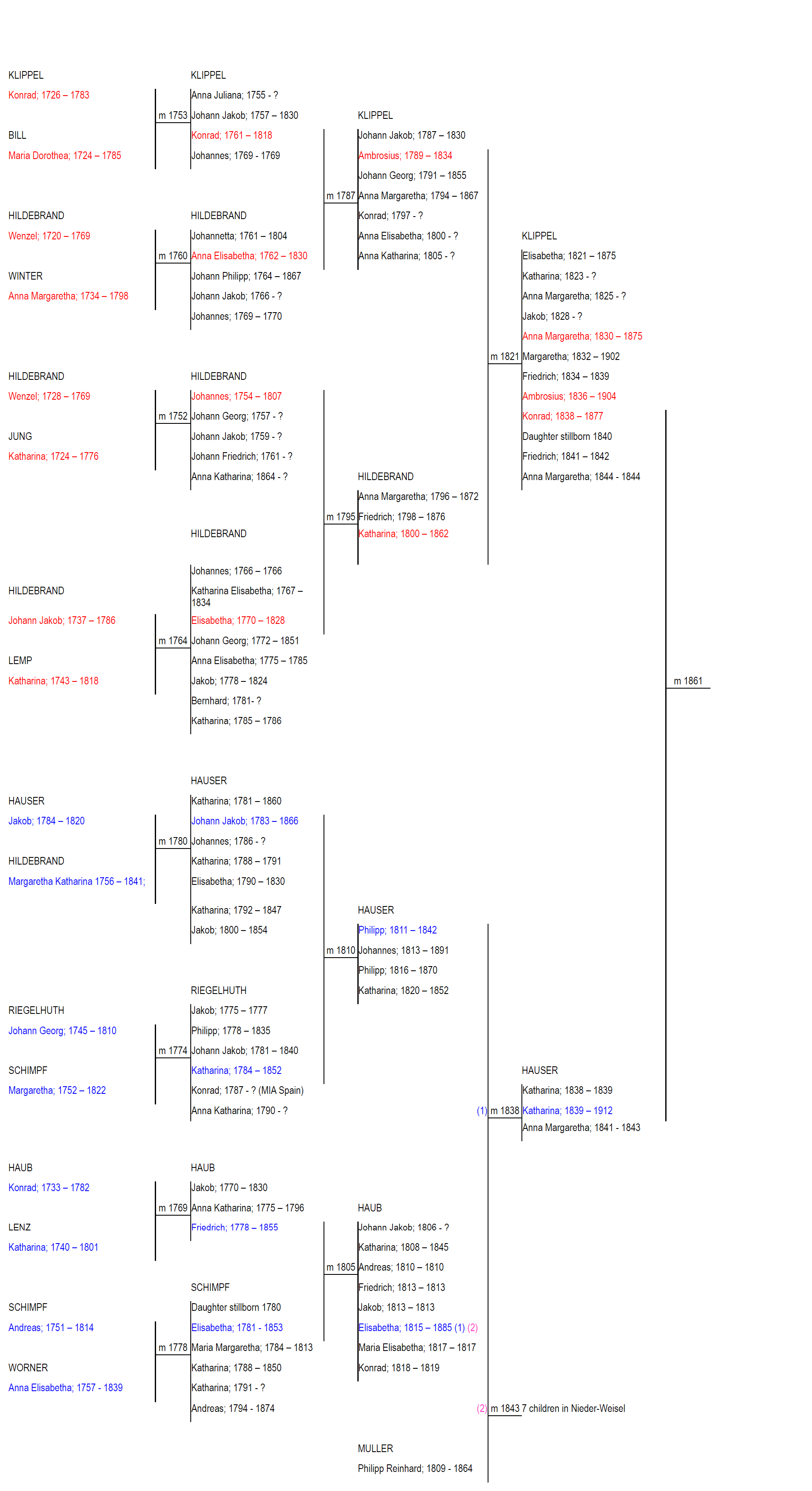Konrad KLIPPEL 1838-1877
The marriage of Ambrosius Klippel and Katharina Hildebrand in Nieder-Weisel in 1821 produced twelve children during the next twenty-three years, the last born when Katharina was in her 44th year. The last child to survive infancy, Konrad was born on 16th September 1838 and was one of eight small mouths which had to be fed in the Klippel household. The straitened circumstances of the family worsened greatly eighteen months after the birth of the 12th child, when Ambrosius died. Katharina encouraged her older children to leave the village, and the 15 year- old Anna Margaretha did so with two of her older sisters. She married Johannes Muller in England in 1853 and, when they arranged to migrate, Konrad decided to join them. He left Nieder-Weisel early in 1855 for the trip along the Rhine to Rotterdam, and crossed to England where he joined up with Anna Margaretha and Johannes. With a number of other emigrants from their village they sailed from Liverpool on 5th December 1855 on board the fastest ship then on the Australian run, the Black Ball Line’s “Marco Polo”, which got them to Melbourne in 85 days, but well outside its record.
The Nieder-Weiselerns went to Ballarat, whence Konrad went on with the Mullers to the goldfields round Beechworth in northeastern Victoria. Konrad was one of the first diggers at the Yackandandah diggings, apparently with some success as he was able to set himself up as a publican in the town. He formed a relationship with Katharina Hauser, another emigrant from his village, who lived in nearby Stanley. Katharina had a baby in Yackandandah in March 1861, whom she named Henry Klippel. She and Konrad married that December in the home of George Beavis of Stanley; his wife was from near Nieder-Weisel. Konrad went back to prospecting for alluvial gold along the Kiewa River; his first daughter, Anna Margaretha, was born at Allan’s Flat and later children at Belvior and Osborne’s Flat.
Konrad’s brother Ambrosius had come to Victoria in 1857, and he followed much the same path. In about 1871, Konrad received a licence to build a hotel at Towong, on what is now the Murray Valley Highway, and Ambrose joined him in the venture. Three children were born to Konrad and Katharina in this town or in nearby Tintaldra, but the first of these, Charles Edwin, died in his first weeks of life, leaving a family of nine. Konrad continued to look for opportunities in the hostelry field and in 1876 embarked on an ambitious project to build a 14-roomed hotel complex on the busy road from Tallangatta to Corryong.
Konrad had maintained a life-long interest in music and often played his button accordion at local dances and celebrations. This led to his unfortunate demise – attempting to get across the swollen stream to play at a dance in Mitta, his horse was swept downstream and Konrad was drowned. The horse, with the accordion and music still tied to its saddle, was located the next morning, but no trace of Konrad was ever found. When the statutory term of seven years had passed, Konrad was declared legally dead.
The hotel Konrad had started to build at Berringama became a home for his widow and family, and ‘The Brick House’ is still a residence for his Klippel descendants over 120 years later. The love of music which brought about Konrad’s untimely death has been passed on to many present-day members of the Klippel family and the sound of the accordion is still to be heard at the music festivals which his descendants inaugurated.
Katharina brought up the eight children who survived and then lived out her life in Berringama. She died, a colonist of 56 years, in 1912, in the 35th year of her widowhood.
View Konrad's Family Chart

